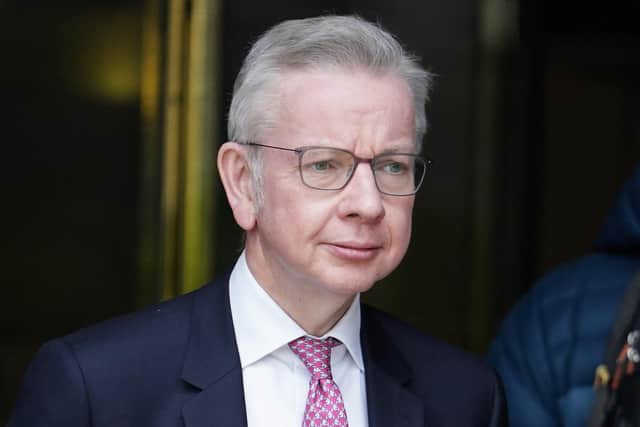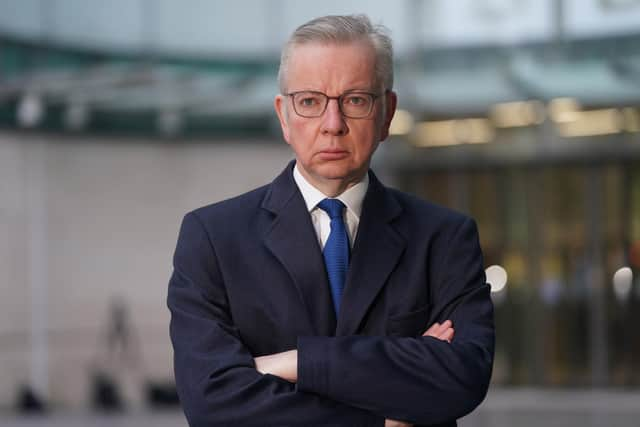Extremism definition: UK Government's definition a 'smash and grab' on human rights, Amnesty International claims
The UK government’s new definition of extremism has been condemned as a “smash and grab” on human rights, as organisations cast in a harsh spotlight condemned the move as an assault on civil liberties.
Launched by communities secretary Michael Gove on Thursday, the redefinition describes extremism as “the promotion or advancement of an ideology based on violence, hatred or intolerance” that aims to “negate or destroy the fundamental rights and freedoms of others”, or “undermine, overturn or replace the UK’s system of liberal parliamentary democracy and democratic rights”.
Advertisement
Hide AdAdvertisement
Hide AdBut the Muslim Association of Britain (MAB) and Mend (Muslim Engagement and Development) said Mr Gove would not dare to make a similar suggestion without the protection of Parliament and legal action may have to be taken if he ever did.


They view the definition, announced in the House of Commons by Mr Gove on Thursday, as nothing more than political posturing and a cynical manoeuvre aimed at appeasing the hard-right base of the Conservative party.
Groups covered by the definition, which is designed to include conduct that falls short of criminality, but is still deemed “unacceptable”, will be denied access to government funding and prevented from meeting ministers and officials or gaining a platform that could “legitimise” them.
The announcement has come against a backdrop of rising anti-Semitic and Islamophobic incidents since the October 7 Hamas attacks in Israel, with government figures previously labelling pro-Palestine protests as “hate marches”. It is unclear if such protests would be impacted.
However, the policy has attracted criticism from charities, human rights groups and opposition parties, as well as Tory MPs.


Sacha Deshmukh, Amnesty International’s chief executive, labelled the expansion of the definition a “dangerous gimmick”, that had come in the wake of protest calling for a ceasefire.
He said: “From the Prime Minister’s disturbing Downing Street speech earlier this month, the introduction of further anti-protest measures and now the expansion of the extremism definition, it looks as if the government is set on shrinking the space for dissenting views and the right to protest.
“An overwhelmingly peaceful protest movement seeking an end to Israel’s mass killing of civilians in Gaza is being used by ministers to clamp down on our civil liberties, the irony is crushing and frightening. This dangerously sweeping approach to labelling groups and individuals ‘extremist’ is yet another smash and grab on our human rights by a government which has become a serial offender in this regard.
Advertisement
Hide AdAdvertisement
Hide Ad“This attempt to stigmatise legitimate, peaceful political activity is taking us further down the road toward authoritarianism."”
The MAB described the proposals as “flawed”, warning they were “undemocratic, divisive, and potentially illegal” and “may involve defining established Muslim organisations as extremist”.
Labour has claimed the new definition raises more questions than answers and was “very unusual”.
Shadow Treasury minister Darren Jones told the BBC: “The slight confusion really is that the government has focused on this definition today, which is not in relation to the counter-extremism strategy, which is now nine years out of date. It’s not an action plan for agencies and others about what action they should take in communities across the country. It’s not even a legal definition.
“All it really does is prevent the government from financing organisations or individuals. That rather implies that Michael Gove is worried they’re doing that at the moment, which raises more questions than he’s been able to answer this morning.”
Senior Tories warned the new extremism definition was neither strong enough to tackle true extremists nor to protect contrarian views.
Robert Jenrick, a Conservative former Home Office minister, told the Commons: “I fear that the definition, though well-intentioned, lands in no man’s land: Not going far enough to tackle the real extremists, not doing enough to protect the non-extremists, those people who are simply expressing contrarian views who might find this definition used against them, not perhaps now, but possibly in the future.
“What reassurance can he give me and others who are concerned about that?”
Advertisement
Hide AdAdvertisement
Hide AdKit Malthouse, another senior Tory, described the strengthened definition as a “government blacklist” and warned there was no right to appeal for groups who meet its threshold.
He said: “I share, along with many other members, some alarm at the emergence of this new definition. Is there really to be no appeal process in this branding of particular groups as unacceptable?
“Not least because, as he will I am sure intend, putting them on a government blacklist effectively will have a chilling impact more widely on their place in society from financial services, to the media, who is likely to engage with them.
“At what stage in the process will those groups that he decides are worthy of examination be able to provide evidence in their defence?”
Mr Gove told MPs that judicial review would be available as an appeal mechanism to groups defined as extremists.
Former Labour leader Jeremy Corbyn also pressed Mr Gove on the right to appeal. The Independent MP for Islington North said: “I urge the Secretary of State to be cautious in all of this, because those of us for example that campaigned against Apartheid in the ‘70s were often condemned. The ANC was never banned in Britain, but there were calls to ban it.
“Things change, history moves on and those that marched for peace in Ireland were condemned at the time and later we had the Good Friday Agreement.”
Mr Gove insisted the definition would not impact free speech, and warned the country’s values of inclusivity and tolerance were “under challenge from extremist groups”.
Advertisement
Hide AdAdvertisement
Hide AdHe told the Commons: “Our definition will not affect gender critical campaigners, those with conservative religious beliefs, trans activists, environmental protest groups, or those exercising their proper right to free speech.
“The government is taking every possible precaution to strike a balance in drawing up the new definition between protecting fundamental rights and safeguarding citizens.”
Comments
Want to join the conversation? Please or to comment on this article.
